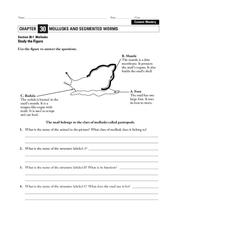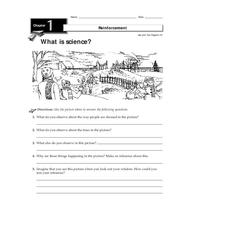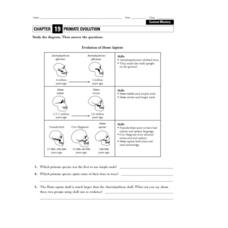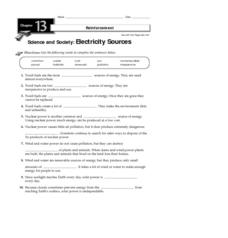Curated OER
Sponges, Cnidarians, Flatworms, and Roundworms
In this simple animals learning exercise, students compare and contrast the body plans of sponges, cnidarians, flatworms, and roundworms. This learning exercise has 4 short answer questions.
Curated OER
Mollusks
In this mollusks worksheet, students use an illustration of a snail to complete 4 short answer questions about the structure and function of the parts of gastropods.
Curated OER
Sponges, Cnidarians, Flatworms, and Roundworms
In this simple animals worksheet, students review the characteristics of sponges, cnidarians, flatworms, and roundworms. This worksheet has 12 matching questions.
Curated OER
Mollusks and Segmented Worms
In this mollusks and segmented worms worksheet, students read information about these two groups of organisms and compare and contrast their general characteristics. This worksheet has 2 short answer questions.
Curated OER
What is Science?
In this scientific observations worksheet, students study an illustration and then complete 5 short answer questions about what they observe happening in the picture.
Curated OER
Ferns and Gymnosperms
For this plant worksheet, students review the different characteristics of ferns and gymnosperms. This worksheet has 12 fill in the blank questions.
Curated OER
What is an Angiosperm?
In this plant worksheet, high schoolers study a diagram of a magnified root cross-section. Students use this diagram to complete 2 true or false questions.
Curated OER
Flowering Plants
For this flowering plants worksheet, students compare the structure and function of a tree trunk and a leaf. This worksheet has 1 true or false and 5 fill in the blank questions.
Curated OER
What is a Flower?
For this flower worksheet, high schoolers use a diagram showing the different parts of a flower to complete 1 matching and 2 short answer questions.
Curated OER
Relationships Among Living Things
In this relationships among living things worksheet, students determine if given statements are true or false. Students correct the false statements making them true. Also, students answer several short questions that relates to...
Curated OER
Flowers and Reproduction
In this plant reproduction worksheet, students review the stages of the reproductive cycle of flowering plants. This worksheet has 1 matching, 1 short answer, and 1 true or false question.
Curated OER
What is an Animal?
In this animal worksheet, students review characteristics of animals including body symmetry, development, and skeletal structure. This worksheet has 3 short answer questions.
Curated OER
Reproduction in Flowering Plants
In this flowering plants worksheet, students review 11 vocabulary words associated with reproduction in flowering plants by matching the term with its definition.
Curated OER
What is an Animal?
In this animal worksheet, students review various characteristics that are associated with animals including body plan and skeletal structure. This worksheet has 11 fill in the blank questions.
Curated OER
The Six Kingdoms
In this kingdoms worksheet, students compare the six different kingdoms. Students complete 2 short answer questions based on this information.
Curated OER
Primate Evolution
For this evolution worksheet, students review 9 terms associated with the evolution of primates. Students place 6 terms into a crossword puzzle and 3 terms into fill in the blank statements.
Curated OER
Evolution of Homo Sapiens
In this Homo sapien worksheet, students use a diagram showing the evolution of man beginning 4 million years ago to complete 3 short answer questions.
Curated OER
Electricity Sources
In this electricity worksheet, learners review the different types of energy sources including fossil fuels, solar, wind, and nuclear energy. This worksheet has 10 fill in the blank questions.
Curated OER
How Do Circuits Work?
In this circuits worksheet, students study a diagram showing a network of wires and switches for electrons to flow from a battery to a light bulb. Students use this diagram to complete 2 fill in the blank statements.
Curated OER
What is a Magnet?
In this magnet instructional activity, learners review what makes up matter, how electromagnets are made, and how compasses work. This instructional activity has 6 fill in the blank and 2 short answer questions.
Curated OER
The Nervous System and the Effects of Drugs
In this senses worksheet, students use webbed information to answer several questions. Students read about each one of the five human senses in order to demonstrate an understanding of the material.
Curated OER
The Nervous System
For this nervous system worksheet, students read a paragraph explaining how electrical signals travel throughout the nervous system. Students complete 2 short answer questions based on the reading and a labeled diagram.
Curated OER
Solve for X
In this math worksheet, students solve for the variable by dividing a whole number or mixed number by a fraction. Five of the problems ask students to compute the answer. Five problems are multiple choice. Answers are included after the...
Curated OER
Worksheet 8
In this math worksheet, students examine the functions that are given. The domains and ranges are varied according to each function. Then they write the proofs for them.
Other popular searches
- Peer Tutoring
- Algebra 2 Free Tutoring
- Peer Tutoring Worksheets
- Lesson Using Peer Tutoring
- Peer Tutoring Lesson Plans
- Science Peer Tutoring
- Math Peer Tutoring
- Peer to Peer Tutoring
- Reading Peer Tutoring
- Peer Tutoring and Reading
- Peer Tutoring in Grammar
- Word Processing Tutoring

























